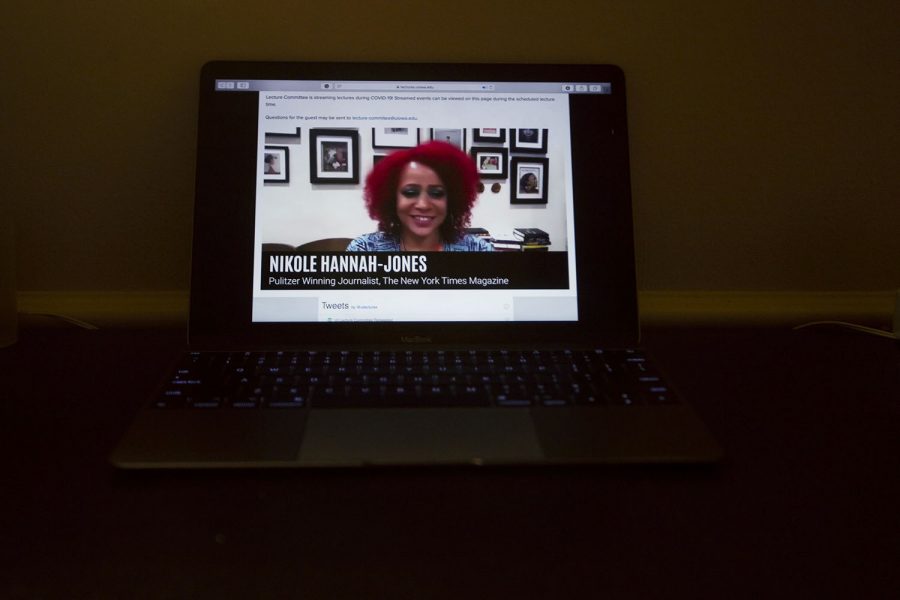University of Iowa Lecture Committee hosts ‘1619 Project’ creator Nikole Hannah-Jones
Nikole Hannah-Jones, investigative journalist, discussed the driving force behind creating the project on the embedded lasting effects of American slavery
Pulitzer Prize Winning Journalist Nikole Hannah-Jones speaks during her virtual lecture on Tuesday, Sept 22, 2020. Nikole spoke on her 1916 project about the continuing history of American slavery.
September 23, 2020
Investigative journalist and creator of the New York Times Magazine’s “1619 Project,” Nikole Hannah-Jones, spoke on a livestream Tuesday night as the University of Iowa Lecture Committee’s most recent guest.
Hannah-Jones, born in Waterloo, Iowa, was awarded the 2020 Notable Iowan Award by the committee at the end of the night for her journalistic work.
“The 1619 Project” was published in the New York Times Magazine and in the form of an audio series in 2019, on the 400th anniversary of the introduction of slavery to the colonies that would eventually form the East Coast of America.
Hannah-Jones said during the lecture that she pitched the project to show how integral slavery was to the foundation of the country, and how the implications of slavery can still be felt today. She said she felt that she had a responsibility working with a platform as large as the New York Times to bring recognition to the lesser-represented aspects of America’s birth.
“I wanted to show in an entire issue of the magazine that across all of these areas of American life that we think have nothing to do with race, have nothing to do with the institution of slavery, we can actually show that connection and really answer that question that every Black person gets at least once and often many times, which is, ‘slavery was a long time ago why don’t you get over it,’” Hannah-Jones said. “I wanted to show we can’t get over it because it is embedded into our institutions and our country has not dealt with it…and that was kind of the genesis of the project.”
Hannah-Jones said the project has garnered enough criticism since its release that she now distances herself from Twitter, where she said she used to spend a lot of time doing research and engaging with different people.
She said many people, however, have embraced the project and appreciated the ways in which it shed light on the country’s past.
“The entire reason the “1619 Project” had to exist is because we have not wanted to treat slavery as central to the American story,” Hannah-Jones said. “We wanted to treat slavery as an asterisk.”
Co-Chair of the UI’s Lecture Committee Hannah Shrader said Hannah-Jones had been on the committee’s radar for a while, and that they had tried to book her in the spring before campus shut down as a result of COVID-19. She said Hannah-Jones was in the unique position of being an Iowa native with a national perspective.
In reference to the Black Lives Matter movement that gained traction over the summer, Shrader said it was important to continue having conversations about the messages in Hannah-Jones’ work.
“This summer brought a lot of momentum,” Shrader said. “A lot of very important conversations came up, and we’re hoping that this lecture will help to continue those conversations among students, among community members, among staff members. Things get lost in the cycle as they stop being present in the news all the time, and so we want to make sure these important conversations don’t get lost.”
Krista Walker, a PhD candidate in education policy and leadership studies at the UI who watched the lecture, said she appreciated Hannah-Jones’ ability to talk frankly about being Black in America and the implications of slavery on how the country continues to operate.
“I think during this time of civil unrest where there’s so many issues with regards to race and healthcare systems, race and educational systems, I mean, racial issues all over, it’s a time for people of color but specifically Black people to just be unapologetically Black,” Walker said. “To be unapologetic about a lot of the issues that we have to deal with.”














